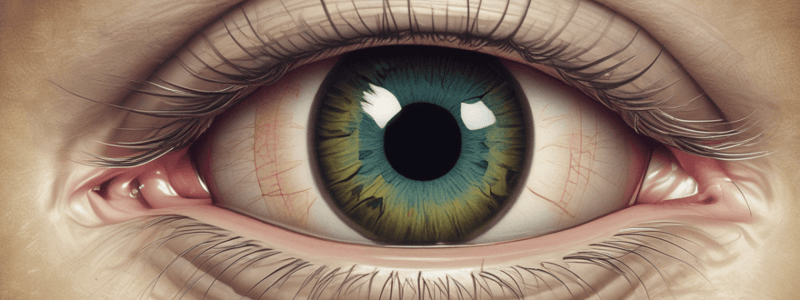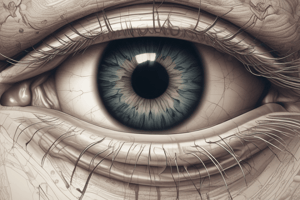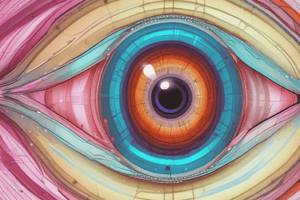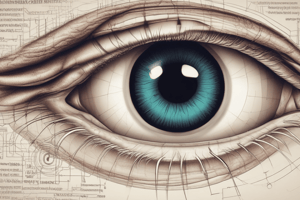Podcast
Questions and Answers
What is a correct characteristic of parasympathetic dysfunction of the pupil?
What is a correct characteristic of parasympathetic dysfunction of the pupil?
- Anisocoria more pronounced in dim illumination
- Anisocoria more pronounced in bright illumination (correct)
- Ptosis without anisocoria
- Anisocoria without ptosis in bright illumination
What is the term for conditions where the light reflex is absent or abnormal, but the near response is intact?
What is the term for conditions where the light reflex is absent or abnormal, but the near response is intact?
- Horner's Syndrome
- Adie's Tonic Pupil
- Anisocoria
- Light-near dissociation (correct)
What is the maximum amount of dilation caused by sympathomimetics?
What is the maximum amount of dilation caused by sympathomimetics?
- 1-2mm (correct)
- 0.5-1mm
- 3-4mm
- 2-3mm
Which neuron arc, involved in the parasympathetic pupil constriction to light connects the EW-nucleus to the ciliary ganglion?
Which neuron arc, involved in the parasympathetic pupil constriction to light connects the EW-nucleus to the ciliary ganglion?
What is an important point to note about bilateral optic nerve disease?
What is an important point to note about bilateral optic nerve disease?
What artery passes over the preganglionic neurons of the sympathetic innervation to pupil?
What artery passes over the preganglionic neurons of the sympathetic innervation to pupil?
What is the term for the pathway that carries sensory information towards the CNS?
What is the term for the pathway that carries sensory information towards the CNS?
Which pathway in the midbrain, does the near reflex pass in the EW- nucleus?
Which pathway in the midbrain, does the near reflex pass in the EW- nucleus?
What type of pathway defects do you rule out when measuring pupil sizes?
What type of pathway defects do you rule out when measuring pupil sizes?
What pupil test do you perform if the light responses are abnormal or sluggish?
What pupil test do you perform if the light responses are abnormal or sluggish?
Will you see a possible APD with a fixed and dilated pupil?
Will you see a possible APD with a fixed and dilated pupil?
Which part of the brain is the starting point of the 1st neuron in the oculosympathetic pupillary pathway?
Which part of the brain is the starting point of the 1st neuron in the oculosympathetic pupillary pathway?
What is the location of the 2nd neuron in the OCULOSYMPATHETIC PUPILLARY PATHWAY?
What is the location of the 2nd neuron in the OCULOSYMPATHETIC PUPILLARY PATHWAY?
What level APD is associated with an amaurotic pupil?
What level APD is associated with an amaurotic pupil?
Which does NOT cause an APD?
Which does NOT cause an APD?
What area is affected with anisocoria more pronounced in bright illumination?
What area is affected with anisocoria more pronounced in bright illumination?
What is the effect of time on the accommodative response in Adie's tonic pupil?
What is the effect of time on the accommodative response in Adie's tonic pupil?
What is the concentration of Pilocarpine used in the diagnostic test for Adie's tonic pupil?
What is the concentration of Pilocarpine used in the diagnostic test for Adie's tonic pupil?
What is the effect of Horner's syndrome on the retractor muscles of the eyelids?
What is the effect of Horner's syndrome on the retractor muscles of the eyelids?
When is anisocoria more apparent in Horner's syndrome?
When is anisocoria more apparent in Horner's syndrome?
What is the term for the slight elevation of the lower lid due to the loss of nerve supply in Horner's Syndrome?
What is the term for the slight elevation of the lower lid due to the loss of nerve supply in Horner's Syndrome?
Which type of Horner's Syndrome is NOT associated with anhidrosis?
Which type of Horner's Syndrome is NOT associated with anhidrosis?
What is the most common cause of Preganglionic Horner's Syndrome?
What is the most common cause of Preganglionic Horner's Syndrome?
What is the term for the abnormality of the iris color in congenital Horner's Syndrome?
What is the term for the abnormality of the iris color in congenital Horner's Syndrome?
What type of innervation is responsible for dilating the pupil?
What type of innervation is responsible for dilating the pupil?
What is the name of the nerve that carries the afferent signal from the retina to the brain?
What is the name of the nerve that carries the afferent signal from the retina to the brain?
What is the term for the pathway that connects the retina to the ciliary ganglion and controls pupillary constriction?
What is the term for the pathway that connects the retina to the ciliary ganglion and controls pupillary constriction?
What is the effect of a defect in the afferent pathway on pupillary response?
What is the effect of a defect in the afferent pathway on pupillary response?
What is the name of the muscle responsible for constricting the pupil?
What is the name of the muscle responsible for constricting the pupil?
Where does the 2nd neuron in the OCULOSYMPATHETIC PUPILLARY PATHWAY terminate?
Where does the 2nd neuron in the OCULOSYMPATHETIC PUPILLARY PATHWAY terminate?
What is the effect of interrupting the sympathetic pathway in the OCULOSYMPATHETIC PUPILLARY PATHWAY?
What is the effect of interrupting the sympathetic pathway in the OCULOSYMPATHETIC PUPILLARY PATHWAY?
Which part of the brain is the starting point of the 1st neuron in the OCULOSYMPATHETIC PUPILLARY PATHWAY?
Which part of the brain is the starting point of the 1st neuron in the OCULOSYMPATHETIC PUPILLARY PATHWAY?
What is the common efferent pathway for pupillary constriction in both the parasympathetic pathway and near reflex?
What is the common efferent pathway for pupillary constriction in both the parasympathetic pathway and near reflex?
In which type of Horner's Syndrome is anhidrosis NOT present?
In which type of Horner's Syndrome is anhidrosis NOT present?
What is the term for the recording of pupils that is Equally Round and Reactive to Light and Accommodation, with No Afferent Pupillary Defect in OD and OS?
What is the term for the recording of pupils that is Equally Round and Reactive to Light and Accommodation, with No Afferent Pupillary Defect in OD and OS?
What is the characteristic of the pupillary light and near responses in Horner's Syndrome?
What is the characteristic of the pupillary light and near responses in Horner's Syndrome?
What is the method used to quantify the Relative Afferent Pupillary Defect?
What is the method used to quantify the Relative Afferent Pupillary Defect?
What is the most common cause of isolated CN 3 palsy with pupil involvment?
What is the most common cause of isolated CN 3 palsy with pupil involvment?
What drop is used to diagnose Adie's Tonic Pupil?
What drop is used to diagnose Adie's Tonic Pupil?
Which optic neuropathy does NOT cause Relative Afferent Pupillary Defect?
Which optic neuropathy does NOT cause Relative Afferent Pupillary Defect?
What is the common accompaniment to congenital Horner's Syndrome?
What is the common accompaniment to congenital Horner's Syndrome?
What is the primary mechanism by which cocaine blocks the release of norepinephrine in Horner's Syndrome?
What is the primary mechanism by which cocaine blocks the release of norepinephrine in Horner's Syndrome?
What is the primary action of apraclonidine on the dilator muscle in Horner's Syndrome?
What is the primary action of apraclonidine on the dilator muscle in Horner's Syndrome?
What is the primary application of hydroxyamphetamine in diagnosing Horner's Syndrome?
What is the primary application of hydroxyamphetamine in diagnosing Horner's Syndrome?
What is the characteristic of the pupil in Horner's Syndrome when apraclonidine is applied?
What is the characteristic of the pupil in Horner's Syndrome when apraclonidine is applied?
What is the primary mechanism by which apraclonidine produces dilation in the affected pupil in Horner's Syndrome?
What is the primary mechanism by which apraclonidine produces dilation in the affected pupil in Horner's Syndrome?
What happens to the retinal image when a prism is placed in front of the eye?
What happens to the retinal image when a prism is placed in front of the eye?
What is the difference between a tropia and a phoria?
What is the difference between a tropia and a phoria?
Which EOM muscle is NOT innervated by the oculomotor nerve?
Which EOM muscle is NOT innervated by the oculomotor nerve?
What is the term for the deviation of the visual axes of the two eyes when stimuli to fusion is operating?
What is the term for the deviation of the visual axes of the two eyes when stimuli to fusion is operating?
What is the purpose of the cover test?
What is the purpose of the cover test?
What is the term for the simultaneous perception of dissimilar objects that project upon corresponding retinal points?
What is the term for the simultaneous perception of dissimilar objects that project upon corresponding retinal points?
What may cause the sudden onset of strabismus in adults?
What may cause the sudden onset of strabismus in adults?
What is the term for the perception of one object that projects upon two different noncorresponding retinal areas?
What is the term for the perception of one object that projects upon two different noncorresponding retinal areas?
What is the term for a latent deviation of the visual axes of the two eyes, brought on by eliminating all stimuli of fusion?
What is the term for a latent deviation of the visual axes of the two eyes, brought on by eliminating all stimuli of fusion?
What is the purpose of neutralization with prism?
What is the purpose of neutralization with prism?
What is the significance of the apex of the prism in neutralization?
What is the significance of the apex of the prism in neutralization?
What is the purpose of inducing phoria in orthophoria cases?
What is the purpose of inducing phoria in orthophoria cases?
What is a screening tool to identify strabismus?
What is a screening tool to identify strabismus?
Which muscle is NOT responsible for a head tilt to the right?
Which muscle is NOT responsible for a head tilt to the right?
What type of tropia is characterized by a deviation that occurs only at one testing distance?
What type of tropia is characterized by a deviation that occurs only at one testing distance?
What is the expected finding in exophoria at 6M?
What is the expected finding in exophoria at 6M?
What is the purpose of the cover test in a strabismus evaluation?
What is the purpose of the cover test in a strabismus evaluation?
When recording cover test results, which is correct for a patient with 22 prism diopters of intermittent esotropia at near in the right eye?
When recording cover test results, which is correct for a patient with 22 prism diopters of intermittent esotropia at near in the right eye?
What is the recording abbreviation for a right 20PD constant esotropia at distance?
What is the recording abbreviation for a right 20PD constant esotropia at distance?
What is the term for a latent deviation that is brought out by eliminating stimuli to fusion?
What is the term for a latent deviation that is brought out by eliminating stimuli to fusion?
What is the significance of the direction and frequency of deviation in strabismus?
What is the significance of the direction and frequency of deviation in strabismus?
What is the difference between a unilateral cover test and an alternating cover test?
What is the difference between a unilateral cover test and an alternating cover test?
What is the term for a deviation that occurs due to the paralysis of a nerve or muscle?
What is the term for a deviation that occurs due to the paralysis of a nerve or muscle?
What is the purpose of the Hirschberg test in a strabismus evaluation?
What is the purpose of the Hirschberg test in a strabismus evaluation?
What is the term for a condition characterized by a deviation that is manifest in only one eye?
What is the term for a condition characterized by a deviation that is manifest in only one eye?
What is the purpose of the Bruckner test in a strabismus evaluation?
What is the purpose of the Bruckner test in a strabismus evaluation?
What is the term for a deviation that occurs in both eyes, but with different angles of deviation?
What is the term for a deviation that occurs in both eyes, but with different angles of deviation?
What Fick's axis runs nasal to temporal?
What Fick's axis runs nasal to temporal?
What type of prism is used to correct hyper deviation?
What type of prism is used to correct hyper deviation?
What does a darker reflex indicate in the Bruckner test?
What does a darker reflex indicate in the Bruckner test?
How far, posterior to the cornea, does Fick's axes intersect?
How far, posterior to the cornea, does Fick's axes intersect?
What is the primary purpose of Confrontation Visual Fields (CVF) in a patient?
What is the primary purpose of Confrontation Visual Fields (CVF) in a patient?
What is the correct placement of the overhead lamp in a Confrontation Visual Fields setup?
What is the correct placement of the overhead lamp in a Confrontation Visual Fields setup?
What is the examiner's role in a Confrontation Visual Fields test?
What is the examiner's role in a Confrontation Visual Fields test?
What is the primary function of the peripheral visual field?
What is the primary function of the peripheral visual field?
What is the correct way to hold the fingers in a Confrontation Visual Fields test?
What is the correct way to hold the fingers in a Confrontation Visual Fields test?
What is the purpose of occluding the patient's left eye in a Confrontation Visual Fields test?
What is the purpose of occluding the patient's left eye in a Confrontation Visual Fields test?
What is the normal range of a single eye's visual field?
What is the normal range of a single eye's visual field?
What is the location of the physiological blind spot in the visual field?
What is the location of the physiological blind spot in the visual field?
What is the primary reason for including visual field evaluation in all basic optometric exams?
What is the primary reason for including visual field evaluation in all basic optometric exams?
What is the primary use of visual field evaluation in cases of glaucoma?
What is the primary use of visual field evaluation in cases of glaucoma?
What is the primary reason for visual field defects?
What is the primary reason for visual field defects?
What is the term used to describe a visual field defect that is the same size and shape in both eyes?
What is the term used to describe a visual field defect that is the same size and shape in both eyes?
What type of visual field defect is associated with ocular abnormalities?
What type of visual field defect is associated with ocular abnormalities?
What is the term used to describe a general reduction in overall sensitivity of the visual field?
What is the term used to describe a general reduction in overall sensitivity of the visual field?
What is the term used to describe a loss of ¼ of the visual field in one or both eyes?
What is the term used to describe a loss of ¼ of the visual field in one or both eyes?
What is the term used to describe the corresponding visual fields of the two eyes?
What is the term used to describe the corresponding visual fields of the two eyes?
What is the term used to describe a visual field defect that is above or below the horizontal meridian?
What is the term used to describe a visual field defect that is above or below the horizontal meridian?
During the testing procedure, what should the examiner remind the patient to do?
During the testing procedure, what should the examiner remind the patient to do?
What is the difference between perimetry and campimetry?
What is the difference between perimetry and campimetry?
What is the purpose of drawing constrictions?
What is the purpose of drawing constrictions?
What is the difference between a scotoma and hemianopsia?
What is the difference between a scotoma and hemianopsia?
What type of visual field defect is typically seen in lesions affecting the optic tract or complete optic radiations?
What type of visual field defect is typically seen in lesions affecting the optic tract or complete optic radiations?
What is the characteristic of visual field defects caused by pre-chiasmal altitudinal lesions?
What is the characteristic of visual field defects caused by pre-chiasmal altitudinal lesions?
What type of lesion can cause a junctional scotoma?
What type of lesion can cause a junctional scotoma?
What is the characteristic of visual field defects caused by glaucoma?
What is the characteristic of visual field defects caused by glaucoma?
What type of lesion can cause an inferior quadrantanopsia?
What type of lesion can cause an inferior quadrantanopsia?
What is the characteristic of visual field defects caused by retinitis pigmentosa?
What is the characteristic of visual field defects caused by retinitis pigmentosa?
Disjunctive eye movements create vergence.
Disjunctive eye movements create vergence.
Which eye movement is considered a version movement?
Which eye movement is considered a version movement?
Antagonist eye muscles are considered prime movers.
Antagonist eye muscles are considered prime movers.
What is the primary movement of the Superior oblique muscle?
What is the primary movement of the Superior oblique muscle?
What is the primary movement of the Superior rectus?
What is the primary movement of the Superior rectus?
What is the secondary movement of the inferior rectus?
What is the secondary movement of the inferior rectus?
The secondary movement of the inferior oblique is abduction.
The secondary movement of the inferior oblique is abduction.
The oblique muscles are primary muscles for torsion.
The oblique muscles are primary muscles for torsion.
When the eye is fully abducted, the SO and IO are in charge of elevation and depression.
When the eye is fully abducted, the SO and IO are in charge of elevation and depression.
When the eye is fully adducted, the SO and IO are in charge of elevation and depression.
When the eye is fully adducted, the SO and IO are in charge of elevation and depression.
Saccades are used to keep the image in the fovea.
Saccades are used to keep the image in the fovea.
Which EOM muscle is the strongest and largest?
Which EOM muscle is the strongest and largest?
Which is not a sign of isolated CN 4 palsy?
Which is not a sign of isolated CN 4 palsy?
A sign of isolated CN 6 palsy is having one eye not being able to abduct.
A sign of isolated CN 6 palsy is having one eye not being able to abduct.
Brown's syndrome is caused by a shortening or tightening of which EOM?
Brown's syndrome is caused by a shortening or tightening of which EOM?
What type of VFD occurs from a lesion of the optic chiasm?
What type of VFD occurs from a lesion of the optic chiasm?
A lesion of the parietal lobe will cause a superior quadrantanopsia.
A lesion of the parietal lobe will cause a superior quadrantanopsia.
Where is the location of the lesion to cause a contralateral homonymous superior quadrantanopsia VFD?
Where is the location of the lesion to cause a contralateral homonymous superior quadrantanopsia VFD?
Pre-chiasmal altitudinal defects generally respect the horizontal meridian.
Pre-chiasmal altitudinal defects generally respect the horizontal meridian.
Most common cause of a right homonymous hemianopsia is due to a stroke of right side of brain.
Most common cause of a right homonymous hemianopsia is due to a stroke of right side of brain.
Post chiasm defects will have VA loss on the contralateral side of lesion.
Post chiasm defects will have VA loss on the contralateral side of lesion.
Prechiasm lesions will produce a monocular contralateral defect.
Prechiasm lesions will produce a monocular contralateral defect.
What type of scotoma is caused by the trial lens being too far from the patient when performing a VF on Humphries?
What type of scotoma is caused by the trial lens being too far from the patient when performing a VF on Humphries?
Toxicity of drugs used to treat arthritis and lupus can cause a paracentral scotoma.
Toxicity of drugs used to treat arthritis and lupus can cause a paracentral scotoma.
Paracentral scotomas are caused by ARMD,exudates, and early glaucomatous VFD.
Paracentral scotomas are caused by ARMD,exudates, and early glaucomatous VFD.
Congruous VFD is not the same size and shape in the same eye.
Congruous VFD is not the same size and shape in the same eye.
Flashcards are hidden until you start studying
Study Notes
Pupil Functions and Anatomy
- The pupil is an objective indicator of the amount of light transduction by the visual system
- Pupil size is determined by a balanced tone in the autonomic nervous system (ANS)
- Afferent and efferent pathways are involved in pupil function:
- Afferent: carries sensory information towards the CNS
- Efferent: carries motor impulses from CNS to the muscles
- Oculosympathetic pupillary pathway:
- 1st neuron (Central): starts in the posterior hypothalamus and ends in the ciliospinal center of Budge (in C8-T2)
- 2nd neuron (Preganglionic): leaves the ciliospinal center and travels to the superior cervical ganglion (SCG) at the level of the carotid bifurcation
- 3rd neuron (Postganglionic): joins the ophthalmic division of the trigeminal nerve (CN V) to reach the ciliary body and the pupil dilator muscle
Pupillary Abnormalities
- Horner's Syndrome:
- Results from interruption of the sympathetic pathway at any level
- Characterized by ptosis, miosis, and anhidrosis
- Can be congenital or acquired, and may be caused by trauma, malignancy, or neurological conditions
- Adie's Tonic Pupil:
- A benign condition characterized by a dilated pupil that reacts poorly to light
- More common in females, and often accompanied by hyporeflexia or areflexia
- Diagnosis is made by instilling pilocarpine 0.125% in the affected eye
Pupillary Reflexes
- Light reflex:
- Afferent pathway: cranial nerve II (optic nerve) perceives light and sends the message to the brain
- Efferent pathway: cranial nerve III (oculomotor nerve) causes both pupils to constrict
- Near reflex:
- Afferent pathway: cranial nerve II (optic nerve) perceives near vision and sends the message to the brain
- Efferent pathway: cranial nerve III (oculomotor nerve) causes both pupils to constrict and the lens to accommodate
Pupil Testing
- Importance of pupil testing: to detect and diagnose pupillary abnormalities
- Methods of pupil testing:
- Efferent testing: shine light in one eye and observe the pupil response
- Afferent testing: shine light in both eyes and observe the pupil response
- Near and accommodative testing: observe pupil response to near vision and accommodation
Abnormal Pupillary Findings
- Anisocoria:
- Physiological anisocoria: unequal pupil size, but both pupils respond to light
- Pathological anisocoria: unequal pupil size, and one pupil does not respond to light
- Pharmacological mydriasis and miosis:
- Sympathomimetics can cause dilation of the pupil
- Parasympathomimetics can cause constriction of the pupil### Ocular Motility and Strabismus
Cover Test
- Occlude the OD, observe the OS, move occluder to OS, and observe OD
- Repeat multiple times at a consistent pace to observe movement of both eyes
- Used to determine the presence or absence of a tropia (unilateral cover test) and phoria (alternating cover test)
Prisms and Neutralization
- A prism shifts the retinal image towards the base of the prism
- Asymmetry in the corneal reflex indicates direction and magnitude of an eye turn
- Prism is measured in mm (1mm = 22Δ)
- Different types of prisms:
- Eso deviation: BO prism
- Exo deviation: BI prism
- Hyper deviation: BD prism
- Hypo deviation: BU prism
- Neutralization with prism:
- Orient the prism with the apex in the direction of the deviation
- Identify the fixating or dominant eye and place the prism over the deviated or non-fixating eye
- Increase the prism magnitude until no movement is seen, then continue adding prism until a reversal is seen
Bruckner Test
- Fixation screening test for strabismus, anisometropia, and media opacities in infants and young children
- Use an ophthalmoscope at 1m away to observe the red reflexes in both eyes
- Compare the brightness of the reflexes to determine fixation
Recording Abbreviations
- XT: Exotropia
- ET: Esotropia
- HT: Hypertropia
- R: OD (right eye)
- L: OS (left eye)
- A: Alternating
- T: Distance
- T': Near
- XP: Exophoria
- EP: Esophoria
- ɸ: Orthophoria
Recording Cover Test Results
- A tropia/strabismus must be identified by:
- Direction
- Frequency
- Deviated eye
- Magnitude
- Testing distance
- Examples: 20Δ RET, 22Δ RE(T)'
- Phorias are identified by:
- Direction
- Magnitude
- Testing distance
- Examples: 8XP/12XP', ɸ/3XP'
Hirschberg Test
- Screening tool for strabismus when other precise methods cannot be used
- Equipment: penlight or transilluminator and occluder
- Procedure:
- Instruct the patient to look at the light
- Occlude the OS and observe the location of the corneal reflex in OD
- Repeat with OD occluded
- Remove the occluder and observe the location of the corneal reflex with both eyes open
- Compare the corneal reflex when one eye is fixating vs when both eyes are fixating
Confrontation Visual Fields
- Equipment: occluder and overhead lamp
- Procedure:
- Dimly illuminated room
- Sit facing the patient at eye level at a distance of 60-80cm
- Without spectacles
- Occlude the patient's left eye and instruct them to look at your left eye
- Hold up 1, 2, or 4 fingers in the peripheral visual field
- Ask the patient to tell you how many fingers you are holding up
- Repeat in all 8 visual field locations
Visual Field Defects
- Terminology:
- Scotoma
- Hemianopsia or Hemianopia
- Quadrantanopsia or Quadrantanopia
- Altitudinal
- Homonymous vs. Heteronymous
- Congruent vs. Incongruent
- Binasal/Bitemporal
- Depression or Constriction
- Visual field defects may be due to:
- Ocular disease
- Systemic disease
- Neurological disease
- Medications
Studying That Suits You
Use AI to generate personalized quizzes and flashcards to suit your learning preferences.




